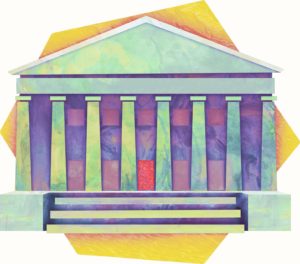Students will learn about the principles that undergird the Magna Carta and how they have influenced important legal documents. More specifically, students will evaluate the Magna Carta’s impact on the U.S. Constitution.
Defenders of Liberty: The People and the Press
This lesson is based on the Annenberg Classroom video that explores the evolution of the free press doctrine, Freedom of the Press: New York Times v. United States.
‘Supreme Law of the Land’: Supremacy Clause
In this lesson, students will explore the origins and evolution of the supremacy clause. How are conflicts between federal and state power resolved?

Making an Issue-Based Video
In this unit, students will learn how to take their research on a community-based issue that they care about and create a video. By showing their video to elected officials, policymakers, the general public and their peers, students may add their voices to the dialogue about community issues.
Campaign Curriculum – Spanish
This lesson for Spanish-speaking students requires students to analyze data, explain data, and articulate their ideas about civic participation.
Student Voices Campaign Curriculum – English
Students will: Interpret data about voting patterns by age group. Discuss possible reasons for current turnout statistics. Write an essay articulating why they think young people should vote.
Justice for All in the Courtroom
In this lesson, students analyze the interplay of processes and procedures that courts use to seat an impartial jury and gain appreciation for the essential role of juries in the justice system. They also explore the responsibilities and limits placed on government by the Constitution in the context of civil and criminal trials.
Key Constitutional Concepts: Creating a Constitution
The first section of the film “Key Constitutional Concepts” examines the creation of the U.S. Constitution and why it was needed. Before viewing the film, students are asked to respond to a key question, which will set a conversation in motion for the whole lesson.
Language of Deception
Critical Thinking
This lesson examines the ways in which terms that pack an emotional punch can add power to a statement – and also ways in which emotive meanings can be used to mislead, either by doing the reader’s thinking for him or by blinding her to the real nature of the issue.
Understanding the Confrontation Clause
In this lesson, students will explore the fundamental reasons for the confrontation clause of the Sixth Amendment. Students will engage in a simulation and identify the history and evolution of the confrontation clause.
The Unfinished Business of Women’s Equality: Educators’ Guide
This guide for K-12 educators provides four types of activity suggestions and related resources for your upper elementary, middle or high school students: class starters; in-depth classroom activities; projects/performances for assessment; and culmination activities.
How a Bill Becomes a Federal Law
Through this lesson, students will learn about the dynamic process of federal lawmaking and how it relates to them.
Key Constitutional Concepts: Right to Counsel
The landmark Supreme Court case Gideon v. Wainwright examines the impact that one event can make on the Constitution through the judicial process. This lesson is designed to give students an opportunity to interact with the Constitution
Key Constitutional Concepts: Presidential Power
This lesson focuses on the landmark U.S. Supreme Court case Youngstown Sheet & Tube Co. v. Sawyer, which challenged the extent to which the president of the United States can exercise power during times of foreign conflict.
Your Right to Remain Silent: Miranda v. Arizona
This lesson explores the landmark Supreme Court case that made law enforcement the protectors of individual liberty where people are most vulnerable – in the interrogation room.
Making Our Fourth Amendment Right Real: Mapp v. Ohio
This lesson explores the landmark Supreme Court decision that makes state governments also responsible for protecting our Fourth Amendment right. With the exclusionary rule, this right becomes real for all of us.
One Person, One Vote: Baker v. Carr and Reynolds v. Sims
This lesson explores these questions: “Does the Constitution require that every person’s vote count the same as another person’s vote? Why would that be important?”
Jury Selection on Trial
In this lesson, students learn about the process used for jury selection and how the role and responsibilities of government in civil and criminal jury trials are viewed by the Supreme Court. They also reflect on the democratic values, principles, and dispositions of character working behind the scenes.
Jury Service: Our Duty and Privilege as Citizens
In this lesson, students learn about the importance, history, and constitutional foundations of jury service. They become familiar with federal and state juror questionnaires and jury summonses.
An Independent Judiciary: Cherokee Nation v. Georgia and Cooper v. Aaron
This lesson explores the role of the judiciary in relation to the legislative and executive branches and how judicial independence has evolved since the founding of the nation.
Judicial Independence: Essential, Limited, Controversial
In this lesson, students learn about the role of an independent judiciary in the United States. Through a cooperative learning jigsaw activity, they focus on operational differences, essential functions, limited powers, and controversial issues.
A Conversation on the Fourteenth Amendment
Three key components of the Fourteenth Amendment – due process, equal protection, and privileges and immunities – are explored in this lesson.
Freedom of Speech: Finding the Limits
In this lesson students gain insight into the many challenges involved in defining and protecting free speech. They also learn about principles that come from U.S. Supreme Court decisions, such as Tinker v. Des Moines Independent Community School District and Morse v. Frederick, and case law that are applied to define the limits for us today.
Equal Justice Under Law: Yick Wo v. Hopkins
This lesson teaches about the cause-and-effect relationships between historical events and the development of constitutional principles that protect the rights of all people in America today.
A Conversation on Judicial Interpretation
This lesson plan focuses on the essential question: How does philosophy affect the way a judge reads the Constitution and what is the effect of that?
